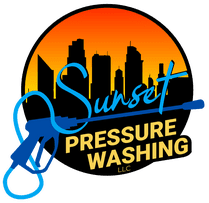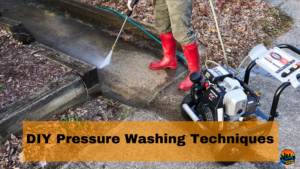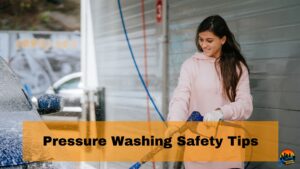
Professional Pressure Washing Services
Pressure washing is an incredibly effective way to clean and maintain various surfaces, from residential driveways to commercial buildings. This method uses high-pressure water spray to remove dirt, mold, grime, and other debris. In this blog, we will explore the various aspects of professional pressure washing services, their benefits, and how you can choose the right service provider for your needs.
What is Pressure Washing?
Pressure washing, also known as power washing, is a highly effective cleaning method that employs high-pressure water spray to remove dirt, grime, mold, algae, and other stubborn residues from various surfaces. This technique is commonly used on buildings, vehicles, and outdoor structures like decks and patios. Below, we explore the key aspects of pressure washing.
Definition and Basic Principles
Pressure washing involves a machine called a pressure washer, which pumps water at a significantly high pressure through a spray nozzle. The force of the water is powerful enough to blast away stubborn dirt and residues that are difficult to remove with conventional cleaning methods.
Applications of Pressure Washing
- Residential Cleaning: Homes benefit greatly from pressure washing, which can be used on siding, driveways, decks, and fences.
- Commercial Cleaning: Businesses use pressure washing to clean buildings, sidewalks, and parking lots to maintain a professional appearance.
- Industrial Cleaning: In industrial settings, pressure washing helps remove tough grime from machinery and large equipment.
Types of Pressure Washing
- Cold Water Pressure Washing: Uses cold water and is effective for removing dirt, mud, and sand from buildings and concrete surfaces.
- Hot Water Pressure Washing: Hot water cleans more effectively by breaking down oily and greasy substances, making it ideal for automotive or kitchen exteriors.
- Steam Pressure Washing: Utilizes steam to lift stains and sanitize surfaces, offering a deeper clean that also eliminates bacteria.
Benefits of Pressure Washing
Pressure washing not only improves the aesthetic appeal of a structure but also contributes to its maintenance by preventing decay and damage caused by the buildup of harmful substances. It is particularly effective for:
- Enhancing property curb appeal
- Preparing surfaces for painting or staining
- Prolonging the lifespan of property features
Choosing the Right Pressure Washing Service
When opting for pressure washing, it is crucial to select the right service provider. Professional pressure washers will have the knowledge and tools to choose the correct pressure settings and cleaning solutions tailored to your specific surface type and contamination level, ensuring a thorough clean without causing damage.
Types of Pressure Washing Services
Pressure washing services are versatile and can cater to a variety of cleaning needs, from residential homes to large commercial and industrial properties. Each type of service is tailored to meet specific challenges and requirements, ensuring that all surfaces are cleaned effectively and safely. Here’s a closer look at the different types of pressure washing services available.
Residential Pressure Washing
This service is designed for homeowners looking to clean the exterior surfaces of their homes. It can greatly enhance the curb appeal and maintain the structural integrity of the property. Common areas cleaned include:
- Driveways and Walkways: Removing stains, dirt, and growths like moss or algae.
- House Siding: Cleansing vinyl, wood, stucco, and other types of siding to prevent decay.
- Decks and Patios: Eliminating buildup of dirt, stains, and weather-related wear.
- Fences: Cleaning wooden, vinyl, or metal fencing to restore appearance.
Commercial Pressure Washing
Commercial pressure washing services focus on businesses that need to maintain a clean and professional exterior. Regular cleaning can prevent safety hazards and improve a business’s image. Services typically include:
- Storefronts and Sidewalks: Ensuring entrances and walkways are inviting and safe for customers.
- Parking Lots and Garages: Removing oil stains, debris, and dirt to enhance customer experience and safety.
- Commercial Buildings: Washing the exteriors of buildings, including windows and roofs, to maintain property value.
Industrial Pressure Washing
Industrial settings often require specialized cleaning due to the nature of the substances involved. Industrial pressure washing is crucial for operational efficiency and compliance with safety regulations. It involves:
- Machinery and Equipment Cleaning: Removing grease, oil, and industrial fallout to prevent malfunctions and extend equipment life.
- Warehouse and Factory Floors: Cleaning large floor areas to prevent accidents and maintain a safe working environment.
- Loading Docks: Regular cleaning to handle the heavy soiling typical in shipping areas.
Eco-Friendly Pressure Washing
As environmental regulations become stricter, many pressure washing services now offer eco-friendly options. These services use biodegradable detergents and ensure proper containment and disposal of wastewater. This is particularly important in areas where runoff can contaminate water sources.
Soft Washing
Soft washing is a technique that uses lower pressure and specialized solutions to clean more delicate surfaces such as roof tiles and old masonry. It’s effective for killing mold, algae, and bacteria without risking damage to the surface.
The Benefits of Professional Pressure Washing
Professional pressure washing offers numerous advantages for property owners, from improving aesthetics to extending the lifespan of building materials. Here’s a detailed look at the key benefits of employing professional pressure washing services.
Enhances Curb Appeal
One of the most immediate benefits of professional pressure washing is the enhancement of a property’s curb appeal. A clean, stain-free exterior is visually appealing and can significantly increase a property’s attractiveness to potential buyers or customers. Regular washing removes unsightly stains, mold, mildew, and other signs of neglect.
Increases Property Value
A well-maintained property not only looks better but can also fetch a higher market value. Pressure washing is a cost-effective way to maintain the exterior of a building, making it more appealing to potential buyers or renters. For commercial properties, a clean and inviting appearance can attract more business.
Prevents Damage
Dirt, grime, and other substances like bird droppings can cause substantial damage to building materials over time. Acidic contaminants corrode paint, siding, and even concrete if not removed promptly. Professional pressure washing helps prevent this decay and avoids the costly repairs that might follow if these contaminants are left unchecked.
Saves Time and Money
Compared to traditional cleaning methods, pressure washing is incredibly efficient and saves significant time and labor. Additionally, regular maintenance helps avoid large-scale repairs due to neglected upkeep, ultimately saving money in the long term.
Promotes a Healthy Environment
Buildups of mold, mildew, algae, and pollen can adversely affect health, particularly for those with allergies or respiratory issues. Professional pressure washing removes these allergens from the environment, reducing health risks and promoting a cleaner, healthier living or working space.
Eco-Friendly Options
Many professional services now offer eco-friendly pressure washing options. These services use biodegradable cleaning solutions and ensure proper water recovery and recycling techniques to prevent environmental contamination. This is particularly important in areas close to water bodies or in urban settings where drainage systems can lead to waterways.
How to Choose the Right Pressure Washing Service
Selecting the right pressure washing service is crucial to ensure that your property is cleaned effectively and safely, without damage. Here are key considerations to guide you in choosing a professional pressure washing company that meets your needs.
Check for Licensing and Insurance
Before hiring a pressure washing company, verify that they are properly licensed and insured. This protects you in case of accidents or damage to your property during the cleaning process. A reputable company will have no problem providing proof of their licensing and insurance coverage.
Evaluate Experience and Reputation
The experience of the pressure washing service is vital. A company with several years in the business is likely to have encountered and successfully managed a wide range of cleaning scenarios. Check online reviews and testimonials to gauge the reputation of the company. Satisfied customers often leave positive feedback, while those who experienced issues will likely share those details too.
Be Aware of Your Surroundings
Pressure washing can easily affect more than just the surface you intend to clean. It is essential to be aware of your surroundings:
- Clear the Area: Remove or cover any objects that could be damaged by water or debris, such as outdoor furniture, vehicles, or landscaping.
- Protect Bystanders: Ensure that no people or pets are in the vicinity who could be accidentally harmed by the high-pressure spray.
- Watch for Electrical Hazards: Be cautious around electrical outlets, fixtures, and power lines. Use a GFCI (Ground Fault Circuit Interrupter) plug to prevent electrical shocks.
Consider the Range of Services Offered
Different properties and surfaces require specific types of cleaning. Ensure the pressure washing service you choose offers the specific services you need, such as residential, commercial, industrial, or specialized fleet cleaning. Some companies also offer eco-friendly cleaning options, which might be important if you are environmentally conscious.
Assess Their Equipment and Cleaning Agents
The quality of the equipment and cleaning agents a company uses can significantly impact the quality of the cleaning job. Professional companies invest in high-quality, commercial-grade pressure washers and use cleaning agents that are effective yet gentle on surfaces and environmentally safe.
Look for Customization and Flexibility
A good pressure washing service should be willing to tailor their services to your specific needs. This includes being flexible with scheduling to minimize disruption to your home or business operations. They should also be able to adjust the pressure and cleaning agents used according to the sensitivity and condition of your property’s surfaces.
Request Detailed Quotes
Ask for detailed quotes from several companies to compare prices and understand what is included in their services. A reliable company will offer a transparent pricing structure and explain any additional charges that may apply. This helps prevent any unexpected costs after the job is completed.
Verify Compliance with Regulations
Make sure the pressure washing company complies with all local, state, and federal environmental regulations, particularly regarding water runoff and the use of chemicals. This compliance not only protects the environment but also ensures that the company follows industry best practices.
Ask About Their Water Reclamation Methods
Particularly in regions with strict environmental controls, it’s important to choose a pressure washing service that practices water reclamation. This process involves the capture and reuse or proper disposal of water used during cleaning, preventing contaminants from entering storm drains and local waterways.
Evaluate Customer Service
Good customer service is an indicator of a company’s professionalism and reliability. Observe how they handle your inquiries. Are they prompt, courteous, and helpful? A company that values customer service is likely to perform a thorough and satisfactory cleaning job.
Pressure Washing Techniques
Pressure washing is a versatile cleaning method that employs high-pressure water jets to remove dirt, mold, and other unwanted substances from various surfaces. However, the effectiveness and safety of pressure washing depend heavily on the techniques used. Understanding different pressure washing techniques is crucial for achieving optimal results without damaging surfaces. Here’s a detailed overview of key pressure washing techniques.
Standard Pressure Washing
Standard pressure washing involves using a high-pressure stream of water to clean hard surfaces like concrete, brick, and stone. This method is ideal for removing heavy dirt, mud, stains, and other debris that are difficult to clean through manual methods.
- Equipment Used: High-pressure washers with adjustable nozzles to control the water flow.
- Common Applications: Cleaning driveways, sidewalks, parking lots, and exterior walls.
Soft Washing
Soft washing is a lower-pressure cleaning technique that is often used for more delicate surfaces where high pressure could cause damage. This method typically uses specialized cleaning solutions that do the heavy lifting, allowing the dirt and grime to be washed away with a gentler stream of water.
- Equipment Used: Pressure washers set to a lower PSI or systems specifically designed for soft washing.
- Common Applications: Roofs, stucco, wood paneling, and other sensitive surfaces.
Hot Water Pressure Washing
Using hot water in pressure washing enhances the effectiveness of cleaning, especially for removing oil, grease, and other sticky substances. The heat helps to break down these materials, making them easier to wash away.
- Equipment Used: Pressure washers capable of heating water, often called hot water pressure washers.
- Common Applications: Restaurant exteriors, automotive shops, and industrial equipment.
Steam Pressure Washing
Steam pressure washing takes hot water cleaning a step further by heating water to a point where it turns to steam. The steam’s high temperature not only cleans effectively but also sanitizes surfaces, killing bacteria and other pathogens.
- Equipment Used: Steam pressure washers that heat water to high temperatures.
- Common Applications: Health-sensitive environments like hospitals, food processing plants, and commercial kitchens.
Rotary Pressure Washing
Rotary pressure washing, or surface cleaning, uses a rotating bar with jets that evenly distribute water pressure over a larger area. This technique is particularly effective for cleaning flat surfaces uniformly and quickly.
- Equipment Used: Rotary or surface cleaner attachments for standard pressure washers.
- Common Applications: Large flat areas such as parking garages, decks, and patios.
Chemical-Assisted Pressure Washing
For extremely tough stains, like graffiti or deep-set oil stains, chemical-assisted pressure washing may be necessary. This technique involves applying specialized cleaning chemicals to break down the stains before washing them away with high-pressure water.
- Equipment Used: Pressure washers with injectors for applying cleaning chemicals.
- Common Applications: Walls with graffiti, heavy industrial stains.
Eco-Friendly Pressure Washing
Increasingly, pressure washing techniques incorporate eco-friendly practices, including the use of biodegradable cleaning agents and water reclamation systems to prevent runoff that could contaminate local waterways.
- Equipment Used: Pressure washers that can capture and recycle water, use of environmentally safe cleaners.
- Common Applications: Any area where environmental impact is a concern, like near water bodies or in urban settings.
Common Mistakes to Avoid in Pressure Washing
Pressure washing is a powerful cleaning method that can greatly enhance the appearance of your home or business. However, if not done correctly, it can also cause significant damage to your property. Here are some common mistakes to avoid when undertaking pressure washing projects.
Using Too Much Pressure
One of the most frequent and critical mistakes is using too much pressure. High pressure can strip away paint, damage wood, etch concrete, and break window seals. It’s essential to adjust the pressure washer to the correct settings for the surface being cleaned.
Tip: Start with a lower pressure setting and gradually increase it only as needed. Use nozzles that distribute water over a wider area to decrease the force on any single point.
Ignoring Manufacturer’s Instructions
Every pressure washer is different, and disregarding the manufacturer’s instructions can lead to poor results or damage to the machine. Not using the proper fuel, oil, or maintenance can shorten the lifespan of your pressure washer.
Tip: Always read and follow the manufacturer’s guide for setup, use, and maintenance.
Using the Wrong Nozzle
Choosing the wrong nozzle can not only be ineffective but can also cause damage. Different nozzles are designed for different types of cleaning tasks based on the spray pattern and pressure output.
- Tip: Familiarize yourself with the different nozzles:
- 0-degree (red nozzle): Delivers a very concentrated stream best used for tough stains on concrete.
- 15-degree (yellow nozzle): Ideal for stripping paint and cleaning hard surfaces.
- 25-degree (green nozzle): Good for general cleaning on decks, patios, and siding.
- 40-degree (white nozzle): Best for light cleaning and delicate surfaces.
- Soap (black nozzle): Used for applying detergents and cleaners.
Neglecting Safety Measures
Pressure washers are powerful and can cause injuries if mishandled. Common injuries include lacerations, punctures, and eye damage from flying debris.
Tip: Always wear protective gear like goggles, gloves, and sturdy footwear. Never point the pressure washer nozzle at people or animals.
Cleaning Incompatible Materials
Not every surface is suitable for pressure washing. Materials like soft wood, sandstone, and certain types of siding can be damaged by high pressure.
Tip: Always test a small, inconspicuous area first. If in doubt, consult a professional or use a gentler cleaning method like soft washing.
Overlooking Environmental Considerations
Pressure washing can lead to the unintended spread of pollutants and chemicals into nearby soil or waterways, particularly if detergents are used.
Tip: Use eco-friendly, biodegradable detergents and avoid cleaning areas where runoff could contaminate water sources. Consider capturing or diverting water to prevent pollution.
Not Preparing the Area
Failing to prepare the area can result in damaged property or incomplete cleaning. This includes not covering nearby plants, outdoor furniture, or light fixtures that might be susceptible to damage.
Tip: Remove or cover any delicate items in the vicinity, and clear the area of loose debris before starting.
Rushing the Job
Rushing through a pressure washing job can lead to uneven cleaning and potentially missing spots. Patience is important to ensure that the entire area is thoroughly cleaned.
Tip: Take your time, methodically moving from one section to another to ensure complete coverage.
Environmental Considerations in Pressure Washing
Pressure washing, while highly effective for cleaning a variety of surfaces, can have significant environmental impacts if not conducted responsibly. Awareness and management of these potential impacts are crucial to prevent pollution and protect the natural environment. Here are key environmental considerations to keep in mind when undertaking pressure washing activities.
Water Usage
Pressure washing can consume a large amount of water. In areas where water conservation is a priority due to drought conditions or water shortages, the use of high volumes of water for cleaning purposes needs to be justified and minimized.
Tip: Opt for pressure washers that are designed to be water-efficient, and plan your washing to minimize water waste. Consider recycling water where possible.
Chemical Use
Many pressure washing tasks involve the use of chemicals to remove tough grime and stains. The choice of cleaning agents can greatly affect local ecosystems, particularly if harmful chemicals are washed into soil or water systems.
Tip: Use environmentally friendly, biodegradable cleaning agents that break down quickly and do not harm vegetation or aquatic life. Always check the labels for environmental certification marks.
Contaminant Runoff
The runoff from pressure washing can contain a mix of dirt, oil, chemicals, and other pollutants that can be harmful to the environment, especially if they enter storm drains, rivers, lakes, or coastal areas.
Tip: Employ containment strategies such as catch basins or absorbent barriers to capture and properly dispose of wastewater. In some regions, regulations may require the collection and treatment of wastewater.
Noise Pollution
Pressure washers can be quite loud, potentially causing noise pollution that affects both wildlife and human populations in the vicinity.
Tip: Schedule pressure washing activities during less sensitive times of the day and use equipment designed to operate more quietly to minimize disturbance.
Energy Consumption
The operation of pressure washers, especially those that are high-powered or heated, can consume a significant amount of energy.
Tip: Choose energy-efficient models and consider using renewable energy sources to power the equipment if possible.
Impact on Wildlife
Pressure washing activities can disturb local wildlife, particularly in sensitive habitats. The noise, presence of humans, and potential pollutants can all impact wildlife behavior and health.
Tip: Conduct a quick environmental assessment before starting a project to ensure that the activity will not disturb local wildlife, particularly during breeding or nesting seasons. Adjust timings and methods if necessary.
Soil Erosion
The force of the water used in pressure washing can lead to soil erosion, particularly if directed towards garden beds or on sloped ground.
Tip: Use lower pressure settings when near susceptible landscapes and direct water flow away from sensitive areas.
Legal and Regulatory Compliance
Many localities have specific regulations governing the discharge of water and the use of chemicals, especially in commercial and industrial settings.
Tip: Ensure compliance with all local environmental laws and regulations. Obtain necessary permits and adhere to best practices for handling and disposing of waste water and chemicals.
Experience Top-Quality Cleaning with Sunset Pressure Washing: Enhance Your Property's Appeal
Sunset Pressure Washing stands as a premier choice for those seeking thorough and professional pressure washing services. Whether you need residential, commercial, or industrial cleaning, Sunset Pressure Washing is equipped with state-of-the-art technology and eco-friendly solutions to rejuvenate your property safely and effectively. Our commitment to customer satisfaction and meticulous attention to detail ensure that your cleaning needs are met with the highest standards of quality and professionalism.
To experience the difference that professional pressure washing can make for your property, visit Sunset Pressure Washing today. Take the first step towards restoring the beauty and longevity of your surfaces. Contact them now for a free quote and learn more about how our services can be tailored to meet your specific needs. Don’t wait—let Sunset Pressure Washing bring a new level of clean to your property!






